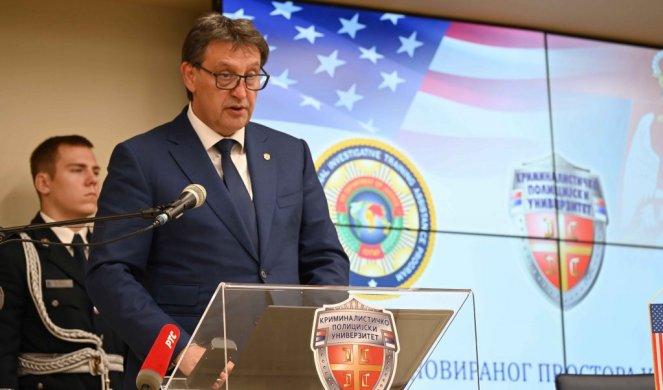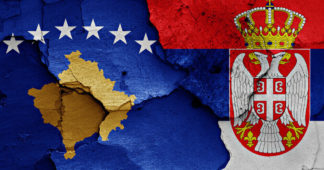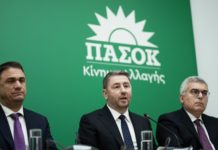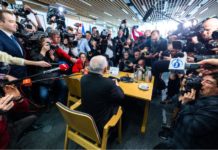The real or fictitious reasons that led the head of Serbia’s intelligence service to hand over documents of delicate national importance to Western structures are difficult to discern. However, the very fact that one of the biggest intelligence scandals in Serbia’s recent political history took place amid a fierce showdown between the so-called “blockaders” and state institutions — speaks volumes.
It’s April 2023. The story goes like this…
SWORN TO NEUTRALITY
The classified Pentagon documents that surfaced on the Discord platform shocked the Serbian public with the severity of the offense committed by the country’s top leadership, which, according to the information, had allegedly approved — in secret — the delivery of weapons to Ukraine by a country that is formally neutral. Although officials in Belgrade denied any involvement in the scandal, the documents confirmed long-standing suspicions since the beginning of the Special Military Operation (SMO): not only does Belgrade possess considerable “military capability,” but it also has the “political will” to carry out such deliveries.
Moscow remained silent. Speculation about possible political repercussions was cut short by Russia’s Foreign Intelligence Service (SVR), which directly accused Serbia of smuggling weapons to Ukraine through intermediary states — the Czech Republic, Poland, Bulgaria, and a number of African clients. The Kremlin’s tone gave no hint of a quick “forgiveness.”
Interestingly, the statement from the Russian service came just a few days after Serbian President Aleksandar Vučić visited Moscow, where — despite significant Western pressure — he stood among other conservative European leaders at the military parade on Red Square.
Following Russia’s accusation, both President Aleksandar Vučić and Prime Minister Đuro Macut announced a “temporary suspension of arms exports,” justifying the move with “pressures from multiple directions.” Thus, Serbia — a country sworn to military neutrality — found itself at the center of military logistics and on one side of the frontline. A scandal of serious proportions raises critical questions: Who is making decisions in Serbia’s security sector? When and with what motivation? And who delivered the classified information — and to what end? In the labyrinth of power, one name stands out: Bratislav Gašić.
THE ARCHITECT OF SILENCE
In the public eye, Bratislav Gašić is not perceived as a shadowy figure, but rather as a political official whose career has been marked by a series of local controversies. However, within the party and security structures themselves — encompassing the military, intelligence service, and police — he is regarded as the architect of silence. Climbing the ranks from Minister of Defense (2014–2016), to Director of the Security Information Agency (BIA) (2017–2022), to Minister of Internal Affairs (2022–2024), and then once again Minister of Defense, Gašić succeeded in accumulating near-total institutional control over all of Serbia’s security bodies.
During his tenure at the helm of BIA, the agency acquired powers that, according to numerous legal experts and analysts, transformed it into a party intelligence service. Under the pretext of fighting organized crime, a parallel influence system was developed, one endowed with excessive authority — including discretionary power to target political opponents, media outlets, and even coalition partners.
His access to classified information opened up a new dimension — the ability to decide which data might be leaked — and to whose benefit.
AMERICAN CONFIRMATION OF DOCUMENT AUTHENTICITY
The leaked documents on Discord were published by U.S. National Guardsman Jack Teixeira. He photographed sensitive military reports during February and March of 2023, and then shared them within a private Discord server dedicated to a video game, where members discussed weapons and geopolitics. Shortly afterward, the documents appeared in the public domain, leading to Teixeira’s arrest and charges for multiple violations of the Espionage Act.
The documents contain analysis of the situation on the Ukrainian front, including losses, logistical shortages, and intelligence assessments that identify Serbia as a potential supplier to the Ukrainian side. Although U.S. authorities did not confirm the authenticity of all the documents, the portions relating to Serbia triggered diplomatic and political fallout.
Under pressure from journalists, American officials confirmed that “some parts of the documents possess a high level of credibility,” and that an investigation is ongoing.
PARALLEL CONTACT — A GUARANTEE FOR SURVIVAL
Although Bratislav Gašić’s name does not appear in the leaked documents, the fact that he held the position of Minister of Internal Affairs at the time leads to some interesting conclusions. As Minister of Internal Affairs, Gašić had access to all security and logistical data, but sensitive information could also have found its way out of the stone fortress in Banjica during his leadership of the Security Information Agency (BIA).
According to sources close to diplomatic circles in Belgrade, the contact between Gašić and American intelligence structures was not recent. Disruptions in official communication in 2023 did not exclude unofficial channels through which certain information reached the Americans. According to a source from the intelligence sector, these parallel channels also served as a form of “insurance” — a personal guarantee for survival at a time when political pressure in Serbia was at its peak. What makes the situation particularly interesting are his secret meetings with American officials, dated much earlier.

CHRONOLOGY: GAŠIĆ’S CONTACTS WITH U.S. INTELLIGENCE STRUCTURES
Contacts between Serbian officials and foreign agencies are nothing new, but few operated so boldly in the realm of “unofficial diplomacy” as Bratislav Gašić.
As Minister of Defense in 2015, Gašić appeared at a NATO symposium in Brussels. Although there were no official meetings, his presence in close proximity to the U.S. delegation opened the door for initial contact. Diplomatic sources describe this as a “quiet approach,” involving meetings without notes, protocols, or signatures.
While serving as director of BIA in 2019, a secret meeting took place at the residence of the U.S. military attaché in Belgrade, attended by representatives of both the CIA and DIA. A source from diplomatic circles described this encounter as “the first significant operational contact,” after which the relationship between the security structure and the American side changed drastically.
From 2021 to 2022, he was seen multiple times near the U.S. Embassy. Sources within the security services claim these were “shadow meetings” — not for exchanging documents, but for confirming political intentions. During this period, the U.S. began more open communication with segments of the Ministry of Internal Affairs, but without clear channels.
MEETING AT THE “KARAĐORĐEVO HEART” BARRACKS
As Minister of Internal Affairs in 2023, shortly before the Pentagon document leak, Gašić was, for the first time, linked to an “active tactical channel.” None of the meetings were recorded in official logs. Ministry of Interior officials stated that this involved “parallel communication” — outside institutional protocols. By all indications, this means that data was handed over directly — as personal insurance at a moment of significant political risk.
As Minister of Defense, on June 2, 2025, Bratislav Gašić hosted U.S. diplomatic representative Alexander Titolo at the “Karađorđevo Heart” barracks. Officially: discussions on “military cooperation in the fields of education and technology.” Unofficially: confirmation that relations with the U.S. run deeper than the public believes. Although Vučić continues to assert the country’s “military neutrality,” the scope and context of cooperation suggest that this is less a matter of principle — and more a policy shaped by current interests.
PENTAGON DOCUMENTS: RETREAT OF THE “GREEN LINE”
In April 2023, a batch of over 100 classified Pentagon documents was leaked. Among them — a chart assessing third-country support for Ukraine. Serbia appears on the list — in the column labeled: “has provided or committed to provide lethal aid.”
The document is marked “SECRET / NOFORN,” meaning it is not to be shared even with allied countries. And yet, it leaked. Alongside Germany, Poland, and Slovakia, Serbia is listed — a country that officially sells weapons neither to Kyiv nor to Moscow.
Shortly thereafter, President Aleksandar Vučić held a press conference, claiming that “Serbia has not sold weapons to Ukraine and does not intend to do so.” But the very document cited by the public suggests otherwise: Serbia may not have delivered directly, but it had the “capability and political will” — key phrases in intelligence terminology signaling a “green light without a trace.”
A SMALL OVERSIGHT — OR SOMETHING MORE?
Russia did not react immediately. Although it admitted to having the information “long before it leaked to Western media,” it chose to speak out only in May 2025, shortly before President Vučić announced a complete halt to arms exports and the implementation of tighter controls.
According to a Reuters report, Serbia officially committed to “investigating the allegations in cooperation with Russian partners.” Though framed as a diplomatic gesture, this was in fact an acknowledgment — not of guilt, but of reality.
Despite claims of neutrality, Serbia was during that period one of Europe’s leading exporters of ammunition. The defense industry is a key driver of the Serbian economy, employing over 24,000 people. Abandoning arms exports would be an economically suicidal act. The balance between rhetoric and reality could only be sustained if the documents were distributed carefully — just enough to create the perception of cooperation, without disrupting the supply chains.
THE “JOVANJICA” AFFAIR — THE FIRST TEST OF ABSOLUTE CONTROL
The “Jovanjica” affair shook Serbia and the Balkans in 2019. A plantation of industrial marijuana, registered as an organic farm, turned out to be part of a network involving officials from the police, military, and Ministry of Interior. The police launched an operation — the BIA did not.
At the helm of the agency at the time was Bratislav Gašić. Under his leadership, not only did the agency fail to launch an internal investigation, but police officers involved in the arrests were demoted or reassigned to lower positions. Instead of expanding the investigation, it was gradually shut down.
According to security analysts, this move was the first major test of total control. If the agency could suppress an investigation in which the evidence was obvious, then no form of cover-up was beyond reach.
RUSSIA’S STRATEGY OF SILENCE — SYMBOLISM OR GEOPOLITICS?
Why did Russia wait two years? Why didn’t it react immediately to the Pentagon documents? While the answer might seem purely political, Moscow plays its cards only when it feels threatened. At the moment when the public had the impression that, after his visit to Moscow, the Serbian president had finally realized he couldn’t sit on two chairs, and when Western pressure — through domestic blockades shaking Serbia — reached its peak, the Russian Foreign Intelligence Service announced that Serbia had “violated trust and supplied the enemy.”
Russia does not use this language lightly. “Violated trust” means: we know what you did. But we’re not saying everything — for now. At the same time, Serbia launches an “investigation with Russia and third parties,” which means — it accepts the accusation, but under the condition that there is no public escalation.
This is the diplomacy of an empire: show your strength — but don’t strike. Yet.
IMPACT ON THE DOMESTIC SYSTEM
After the massacre at “Vladislav Ribnikar” Elementary School, and just three days later in Dubona, a town near Belgrade, Serbia fell into a deep social crisis. Demands for resignations, dismissals, and political accountability — everything was on the table.
Despite the fact that he was Minister of Internal Affairs at the time, responsible for the police and security procedures, the name of Bratislav Gašić was barely mentioned in the media. KRIK, BIRN, and other investigative outlets omitted his case. None of the published analyses questioned his responsibility.
According to claims by NGOs, this was a case of a “deliberate media vacuum,” a form of systemic protection.
While Serbia was facing internal upheaval, media outlets presenting themselves as independent and investigative — such as KRIK, BIRN, and Insajder — did not publish a single analysis between 2022 and 2025 focusing on Bratislav Gašić’s role within the security apparatus. Not a single in-depth report. Not a single thematic program. Despite the fact that he held positions involving direct responsibility for the defense industry, Ministry of Interior, BIA, and contacts with foreign intelligence services — he became “invisible” in media terms.
IN THE GOOD GRACES OF KRIK, BIRN, AND NED
In September 2024, just before the collapse of a canopy structure, a tragic traffic accident occurred on the Kraljevo–Raška road. A military “PASARS” vehicle, driven by a soldier under the influence of alcohol, crashed into a five-member family. The soldier, who was later sentenced to 12 years in prison, had a blood alcohol level of 0.2‰ at the time of the crash. Despite the fact that three minor children died in the accident and the case resonated widely with the public, none of the mentioned media outlets ever called for the dismissal of Bratislav Gašić as Serbia’s Minister of Defense. On the contrary, the incident was forgotten after just seven days.
Public attention was redirected toward the victims of the collapsed canopy in Novi Sad, where, after several months of protests and blockades across Serbia, the main demand became the calling of early elections.
This untouchability was not crafted by Gašić’s advisors — it was sustained by the financial structure of Serbia’s so-called “independent media.” How?
A 2023 investigation by OCCRP revealed that over 80% of KRIK’s annual budget is funded through grants from the American National Endowment for Democracy (NED), Open Society Foundations, USAID, and several European donors. BIRN, meanwhile, receives support from the European Commission, the Norwegian Ministry of Foreign Affairs, and NED. These organizations have specific priorities: government transparency, corruption in public procurement, and political abuse of the judiciary. But not — covert ties with Western intelligence agencies.

SOME TOPICS SHOULD NOT BE PUSHED
Bratislav Gašić, as an official with documented ties to NATO and the U.S. Embassy, and as a man whose actions were fully aligned with Western interests, was never the focus of these media outlets. He was not seen as an adversary to the system — many considered him a resource of the system.
In a 2024 podcast, a former KRIK journalist stated:
“There were tough stories on Gašić — including direct connections with CIA personnel and some data on arms logistics routes. But those stories never got the green light. No one explicitly bans you, but you realize it’s not the kind of topic to push if you want to keep working.”
Is that just self-censorship? Or an editorial strategy? It doesn’t matter — the result is the same: a media blind spot. The man who holds the most files in the country, the greatest control over the police and the BIA, avoided media scrutiny, investigations, or calls for accountability.
And so, “media freedom” was transformed into tactical silence — provided your sources are on the “right side.”
AMERICA’S “QUIET PARTNER”
In Serbia’s contemporary political system — where dismissals are common, scandals frequent, and blame is quickly assigned by name — the sole exception is Bratislav Gašić, whose political and security longevity represents an anomaly. He survived the “kneeling journalist” scandal, the Jovanjica affair, a helicopter crash, pressure after the Ribnikar massacre, the tragic death of an entire family caused by a soldier in a military vehicle, and the leaking of classified information.
No dismissal. No indictment. No investigation.
The fact that he survived politically does not imply innocence — it implies protection. And protection on multiple levels.
The Pentagon documents leaked in April 2023 clearly speak of Serbia’s cooperation in providing “lethal aid to Ukraine.” These decisions were not made in Parliament or by the government. They were forged along a chain: intelligence services, logistics, international partners. That chain could only be built by someone who controls the BIA, the Ministry of Internal Affairs, and the Serbian military.
According to diplomatic sources, the U.S. Embassy had been cultivating an “operational relationship” since 2019 with certain structures within the Ministry of Internal Affairs — formally headed by Gašić. It is no coincidence that in American media he enjoys the status of a “white bear” — his name is absent in all analyses concerning arms exports. Furthermore, Gašić has not been the target of criticism in any report by Western observers.
In the world of diplomacy, that means one thing: a useful player.
RUSSIA: ENEMY OR HOSTAGE?
When Russia’s SVR intelligence service accused Serbia in May 2025 of secretly exporting weapons to Ukraine — no one mentioned Gašić. Not the BIA, not the Ministry of Interior, not any officials. Moscow did not name an individual culprit. Only the state.
That can mean one of two things: either they genuinely don’t know who is responsible — or they do, but are keeping that information as leverage. The second option is more dangerous: if Moscow deliberately chose not to name Gašić as the threat — his transgression could end up costing Serbia more than we can currently imagine.
We remind our readers that publication of articles on our site does not mean that we agree with what is written. Our policy is to publish anything which we consider of interest, so as to assist our readers in forming their opinions. Sometimes we even publish articles with which we totally disagree, since we believe it is important for our readers to be informed on as wide a spectrum of views as possible.











